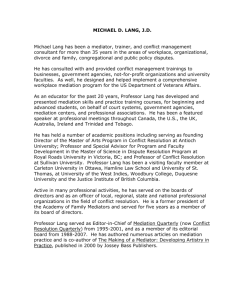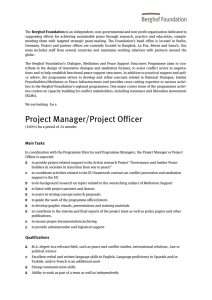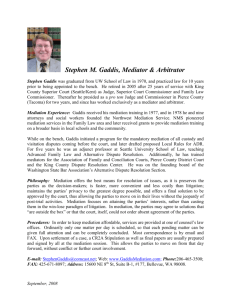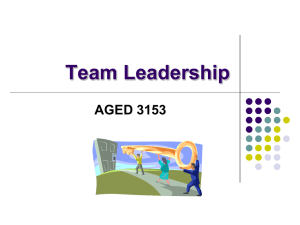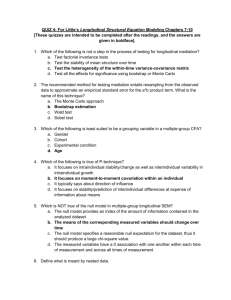Mediation Ghana 08
advertisement
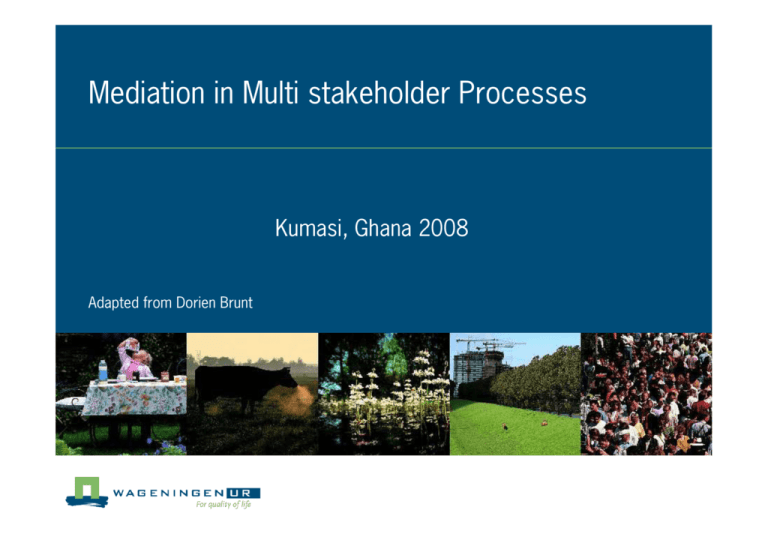
Mediation in Multi stakeholder Processes Kumasi, Ghana 2008 Adapted from Dorien Brunt Mediation definition Mediation is a specific form of conflict resolution where the mediator as an independent third party helps the parties find a solution that is based on mutual interest. Characteristics of Mediation 1. The restoration of disrupted communication between parties. 2.Interest based facilitation rather than arbitration Rules of Mediation Everything that is discussed in the mediation between parties is and remains confidential, even if the mediation fails. The mediator is neutral and has – if the parties cannot find a solution – no power to make a decision The parties are completely free to leave the mediation if they see no improvement in the situation. Stages of Mediation Intake stage Create a good atmosphere: welcome the negotiation partners and underline shared interests. The parties commit themselves to the negotiation process and to rules such as: confidentiality voluntary Elaborate work procedures and check mandates Intake reaching process agreement Rules of conduct for a conducive atmosphere (To prevent domination, role conflict, low participation, poor follow through assignments, failure to start on time) Feasible process objectives (diagnosis, improved relationships, mutual understanding, generating inclusive solution) Stages of Mediation Exploration stage This serves to make the parties able to negotiate with each other. The parties are asked: what caused a rift between them, why they themselves cannot resolve the conflict and whether they are willing to resolve it together. The emphasis is on making the communication between parties effective. Stages of Mediation Negotiations The parties are encouraged to think about: what they want, what the wishes of the other side are, what they can offer to each other, and what they need from each other. Focus on interests rather than positions Position = Interest = Your preferred solution The need underlying your position Something you have already decided upon What caused you to so decide Why Negotiations become Positional We assume we have the right and only answer to the problem We assume a “fixed pie” We assume that incompatible positions = incompatible interests We assume: “I shouldn’t have to solve the others’ problems” Conflict – Positions and interests Position/ Demand Interest Needs Negotiating from Interests Treat positions as “openers” and search for interests behind positions Identify the parties’ interest – e.g. ask why they hold certain positions. Note: all people share basic interests. Discuss interests: Explain own interests and try to understand the other parties’ interest, by restating the other’s interest Search for common ground and mutual interests Clarify the “real problem” Reframe the problem as satisfying as many interests as possible Focus on desired solution, not on past events. Questions to Uncover Interests “Help me understand why this is really important to you.” “What concerns do you have?” “What’s the real problem?” “What would be wrong with…?” “What about this…?” “What are your fears concerning this?” “What exactly do you want from me?” Mediation stage – come to agreement Come to agreement & make last concessions. Check feasibility, pay offs and risks. Are the various needs fulfilled, predefined evaluation criteria met? If not, get back to the exploration phase. Check gradient of agreement. If the differences are too big, skip the agreement. Make concrete action plans (elaborate who, what, where, when and how) Gradients of agreement Enthusiastic > Block 1. 2. 3. 4. 5. 6. 7. 8. Endorsement: I like it Endorsement with a minor point of contention: Basically I like it Agreement with reservations: I can live with it Abstain: I have no opinion Stand aside: I do not like this but do not want to uphold the group Formal disagreement but willing to follow the majority Formal disagreement with request to be absolved of responsibility for implementation Block: I veto this proposal Skills and Instruments What are “ does and don’ts” for a mediator? Skills and Instruments Innocent Lazy Homeless Skills and Instruments Ask Questions: What, when, who. (Be careful with why !) React on nonverbal communication Disarming sentences,underline shared interest Ground rules not to interrupt or pressure individuals to talk Descriptive speech, I statements and active listening Switch by summarising, ask people to summarise each other Respect. Problem oriented rather than to persuade people to change opinions Issues, new ideas and suggestions are open for debate Constructive proposals Ask what people do want, not what they don’t want! Skills and Instruments Reframing From negative to positive “you said you don’t like that there are so many conflicts. I understand that you would like to find a constructive collaboration?” From ‘their fold’ to ‘our problem’ “You have the feeling that they don’t tell you the truth, so you are looking for ways to openly communicate with each other?” From complain to vision “You said nobody takes responsibility. So you wish that everybody is motivated?” Language that… Deescalate: Listening Open questions Showing empathy Positive body language Escalate: Interrupting Closed questions Ignoring Negative body language Mediation in Multistakeholder Processes So far for the theory, let’s now try to use mediation skills! Mediation in practice – group work Three groups: each group works out a case in a role play. Think of a few complains/arguments that you expect from the key stakeholders involved in a conflict in your MSP. Write these down. Mediation for deescalation of conflict Objective: Need: Facilitator: to learn constructive communication for deescalation. Group: to apply the rules of conduct. It is very difficult to explore the issue without heightening emotions. It is crucial to think of effective rules of conduct and process goals Procedure: Select a facilitator and an observer for the facilitator. 10 min. Role play. Facilitator practises communication strategies. Observe whether facilitator deliberately applies the points of constructive communication. Observe the effect on the people. 10 min. Feedback about effectiveness mediation strategy. Remember to listen carefully!! Thank you © Wageningen UR


